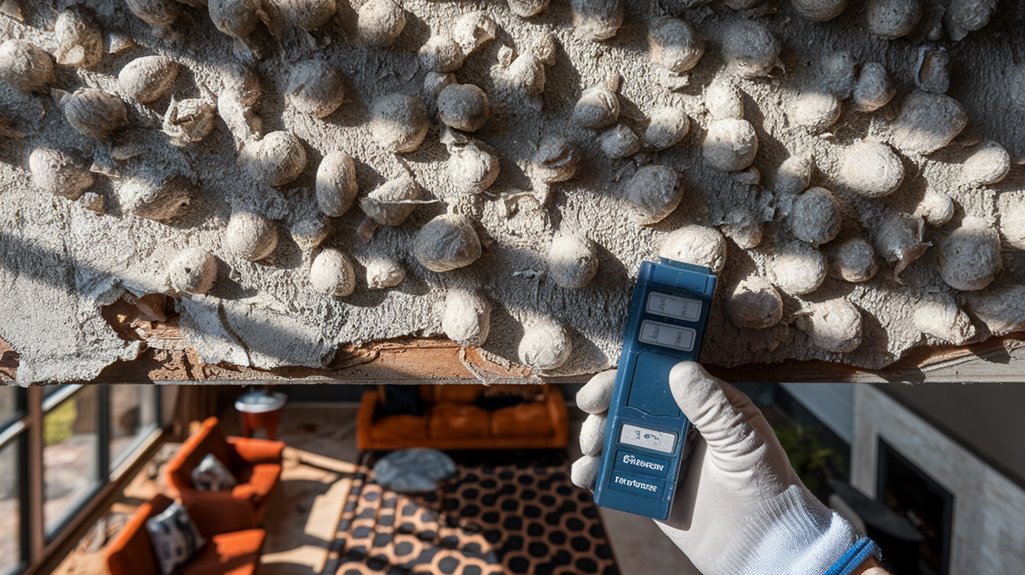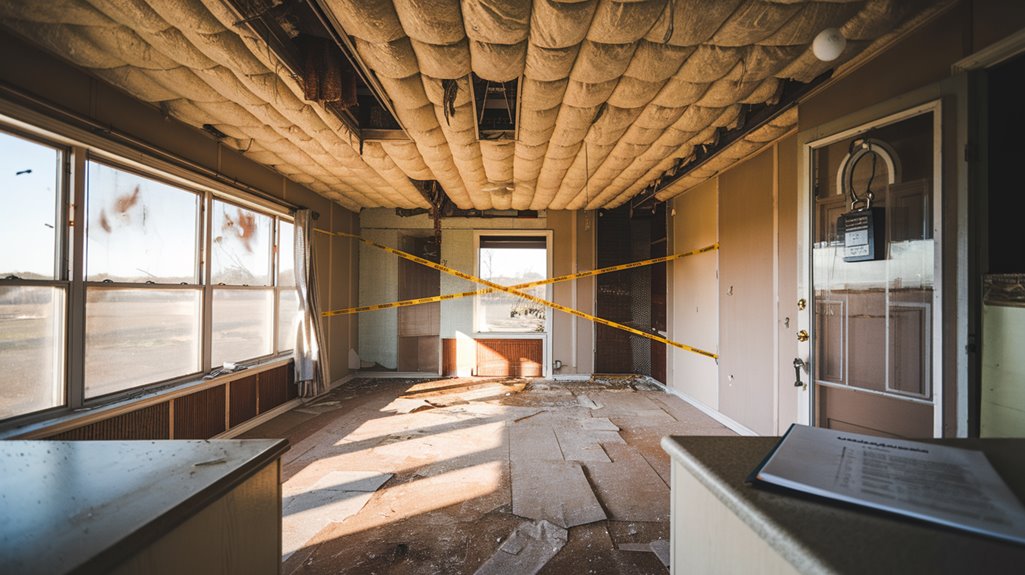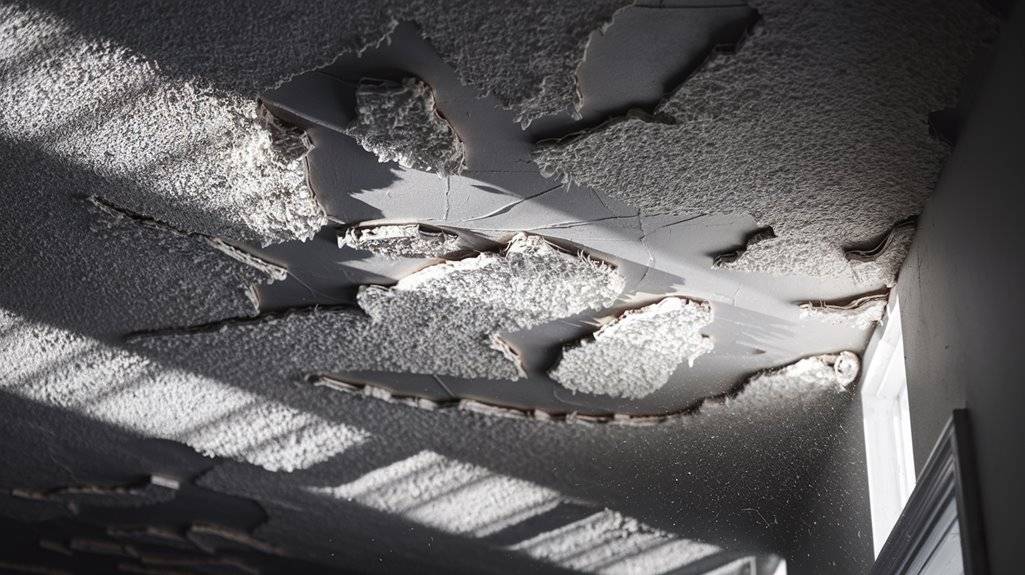Discovering asbestos in your home can trigger immediate stress and uncertainty about selling prospects. Many homeowners face this challenge, especially with older properties built before 1981.
You might worry about legal issues, safety concerns, and the impact on your property’s value. Your concerns are valid since asbestos can scare potential buyers and complicate the selling process.
The presence of this material might lead to failed inspections, costly remediation, or significant price reductions. You need clear guidance to handle this situation properly.
You can successfully sell a house with asbestos through proper disclosure, professional assessment, and strategic pricing.
This guide will walk you through essential steps and practical solutions to overcome asbestos-related challenges during your home sale.
Key Takeaways
- Legally disclose all known asbestos presence, including location and condition, to potential buyers to avoid future legal complications.
- Professional inspection determines asbestos condition and helps decide between sealing ($5,000-$25,000) or complete removal options.
- Expect property value reduction of 20-25%, but consider offering repair credits or price adjustments to maintain market competitiveness.
- Target experienced buyers like investors, renovation specialists, or vintage home enthusiasts who understand asbestos management.
- Document all asbestos-related information, including inspection reports and current condition, to support transparent negotiations with buyers.
What is Asbestos?

Asbestos is a natural mineral fiber found in rocks and soil across the world. This material gained fame in construction for its excellent heat resistance and strength. It commonly exists in older homes built before 1980. You can spot it in insulation, roofing, floor tiles, and pipe coverings.
Intact asbestos poses little risk to human health and safety. However, damaged materials can release tiny fibers into the surrounding air. These invisible particles enter the lungs through normal breathing. If people inhale these fibers regularly, they might develop severe health issues. We often see diseases like lung cancer and mesothelioma in exposed individuals.
Since these health problems take many years to show up, prevention is essential. You should never try to remove asbestos-containing materials by yourself. Instead, contact certified professionals for proper testing and removal. If your house was built before 1980, it might contain asbestos materials. So, regular inspection by experts will help maintain a safe living environment.
Can You Sell a House with Asbestos?
You can sell a house containing asbestos through proper disclosure and management of the situation. We understand that selling such properties requires special attention to legal and safety requirements. You must inform potential buyers about the presence of asbestos in your home. This disclosure helps build trust and prevents future legal issues.
If the asbestos remains undamaged, many buyers will still consider purchasing your property. You have three main options for selling your house. While some sellers choose to reduce the price, others opt for complete removal. So, negotiating repair credits during the sale remains another viable choice.
When home inspectors find asbestos, proper documentation will ease the process. You should keep records about the location and condition of asbestos materials. If you work with experienced real estate agents, they will guide you through complex situations.
This approach ensures a transparent and successful sale of your property. Since older homes often contain asbestos, buyers might expect such issues. We recommend consulting professionals who specialize in asbestos-related property sales.
Which Parts of a House Commonly Contain Asbestos?
If you’re selling a home built before 1980, you’ll likely find asbestos in multiple areas, particularly in insulation wrapped around pipes, ductwork, and within walls. Asbestos was commonly used in vinyl floor tiles, ceiling tiles, and acoustic ceiling materials due to its fire-resistant properties.
Your home’s exterior may also contain asbestos in roofing materials, shingles, and siding products that were popular during the mid-20th century.
Insulation Materials
Asbestos exists in many types of insulation materials throughout older residential buildings. You will often spot this hazardous material around heating ducts and water pipes. It can also hide within wall cavities and attic spaces.
If your home was built before 1980, it might contain asbestos-based insulation products. While asbestos provides excellent heat resistance, it poses serious health risks when disturbed. This dangerous substance requires careful handling by trained professionals.
When selling your property, you must inform buyers about potential asbestos in the insulation. Professional inspectors can test your home’s insulation materials for asbestos content. So, it’s vital to schedule an inspection before making any changes to old insulation.
This toxic material needs special removal techniques to prevent fiber release into the air. If the inspector finds asbestos, you can choose between encapsulation or complete removal. We recommend working with certified contractors who follow safety protocols.
Flooring and Ceiling Tiles
Asbestos was commonly used in flooring and ceiling tiles in homes built before 1980. You can find these materials in vinyl floor tiles, sheet vinyl flooring, and acoustic ceiling tiles. This presence creates important considerations for homeowners who plan to sell.
The most common size for asbestos floor tiles is 9×9 inches. While 12×12 inch tiles might also contain asbestos, they are less common. If your home has older tiles, you should consult a professional for proper identification.
So, intact tiles do not create immediate health risks for residents. However, damaged or worn materials can release harmful fibers into the air. When tiles show signs of wear, you must contact a certified inspector for testing.
We strongly advise against any DIY removal of suspected asbestos materials. This task requires specialized knowledge and safety equipment. Since proper testing helps with selling decisions, you should schedule an inspection before listing your home.
If your inspection reveals asbestos, professional remediation might be necessary. This information will affect your disclosure requirements and sale strategy.
Roofing and Siding Materials
Asbestos was a popular choice for exterior building materials in the past. You can often find it in roofing shingles, corrugated panels, and siding products. This material gained popularity due to its fire-resistant nature and long-lasting strength. When these materials stay intact, they pose minimal risk to homeowners.
If you plan to sell your house, you must report any asbestos in exterior elements. Most buyers understand that older properties might contain asbestos materials. They will want proof of proper maintenance and current condition. Professional inspectors can assess and document the state of these materials.
If the materials show damage, you should hire experts for removal or encapsulation. When asbestos roofing remains undamaged, it presents no immediate health concerns. So, a thorough inspection report can help ease potential buyers’ worries.
How to Sell a House with Asbestos

When selling a house with asbestos, you’ll need to start with a professional inspection to document the type, location, and condition of any asbestos-containing materials.
You must comply with state disclosure laws and provide potential buyers with detailed information about the asbestos presence, including any previous testing or remediation efforts.
Based on the inspection results, you can then decide whether to remove the asbestos, manage it in place, or adjust your selling price to account for future remediation costs.
Get an asbestos inspection
A professional asbestos inspection reveals hidden risks in your home before listing it for sale. You should hire a certified inspector who checks every part of your property. This expert takes samples from materials that might contain asbestos. If the test results are positive, you will need to make important decisions.
We recommend getting clear documentation through proper laboratory testing of samples. You can include these inspection results in your property disclosure documents. This step protects you from future legal problems with buyers. So, if you need to remove or seal asbestos, you will know exactly where to start.
This detailed report helps you talk about prices with potential buyers more confidently. When buyers see official test results, they feel more secure about their purchase. If you handle asbestos issues before selling, your home’s value might increase. You can also avoid lengthy negotiations about repairs during the sale process.
Follow disclosure laws
Legal disclosure laws require you to inform potential buyers about asbestos in your property. You must share all test results from asbestos inspections with interested buyers. This information needs to appear on your seller’s disclosure form. Your documentation should list every location where asbestos materials exist.
If you fail to disclose asbestos, you could face serious legal penalties. Each state follows different rules for asbestos disclosure requirements. So you should check with a real estate agent about local laws.
While some sellers worry about sharing this news, buyers often understand the situation. Most people know that older homes may contain asbestos materials. Your honesty will help build trust with potential buyers during the sale process.
Remove or manage asbestos
You need to make a choice about asbestos in your home before selling it. When asbestos remains undamaged, you can choose to manage it through sealing methods. This solution will cost less than complete removal. Many buyers will accept a well-managed asbestos situation.
If you find damaged asbestos materials, removal becomes necessary for safety. The removal costs will range between $5,000 and $25,000 based on size. You should consider this expense as an investment in your property’s value. Since buyers prefer asbestos-free homes, removal can boost your sale price.
A professional inspection will help determine the right approach for your situation. You must hire licensed experts for any asbestos-related work. It is essential to keep records of all asbestos work done. These documents will prove valuable during the home sale process.
Get removal estimates
You should contact multiple licensed asbestos removal contractors for accurate cost estimates. We recommend getting at least three different quotes to compare prices and services. These estimates must include testing, containment, disposal, and air quality checks.
You need to verify each contractor’s license, insurance coverage, and past project experience. If contractors follow proper safety rules, they will explain their protocols clearly. This documentation helps meet disclosure requirements during property sales.
While comparing estimates, focus on quality and expertise rather than just low prices. When contractors show deep knowledge and safety commitment, they are more reliable choices. So, keep all quotes and test results for future buyer negotiations.
If you pick the right contractor, the removal process will be safe and efficient. Since proper documentation matters, save all estimates and related paperwork carefully.
Set a fair price
A fair price balances market value with any necessary adjustments for property condition. Since asbestos affects home value, you must consider three main factors before pricing.
You need to understand local market trends for accurate pricing. We suggest checking sales data of similar homes in your neighborhood.
The cost of asbestos removal will impact your final asking price. It makes sense to subtract full remediation expenses from current market value.
If you want to attract buyers, consider offering a repair credit instead. This option can help maintain a higher listing price while addressing buyer concerns.
Many experienced buyers know that older homes often contain asbestos materials. You should still disclose this information upfront to build trust.
A real estate agent can guide you through the pricing process effectively. When you work with an expert, they will help find the right balance.
This approach ensures your home stays competitive in the current market. If you price correctly, buyers will see the property’s true value despite the asbestos.
The final price must reflect both positive features and existing conditions. So, take time to evaluate all factors before setting your asking price.
Disclose to buyers
Disclosing asbestos to buyers is a legal duty for every home seller. You must tell potential buyers about any asbestos found in the property. This information should include where asbestos exists and its current state. If you hide these facts, you could face serious legal problems.
The home inspection will likely focus on asbestos-related concerns. You need to show records of past asbestos tests and treatments. If buyers request new asbestos tests, you should cooperate fully with their demands. The inspection results will help buyers make informed decisions about the purchase.
Since transparency matters in real estate deals, honest disclosure builds trust. We recommend getting a professional asbestos check before listing your house. This step can prevent unexpected issues during sale negotiations. If the inspection reveals asbestos, you can address concerns early. So, you will avoid last-minute problems that could cancel the sale.
Find the right buyers
Finding suitable buyers requires careful targeting when selling a home with asbestos. You should focus on specific groups of buyers who understand older properties well.
Investors make excellent potential buyers because they often have experience with asbestos properties. These buyers know how to manage and renovate homes that contain asbestos materials.
When you target renovation specialists, they will understand the proper handling of asbestos materials. They can assess the costs and procedures for safe remediation.
If you market to vintage home enthusiasts, they will likely appreciate the property’s character. These buyers often work with home inspectors to evaluate asbestos conditions properly.
So, connecting with experienced buyers will make the selling process smoother and more efficient. You can reach out through real estate agents who specialize in older properties.
Since these buyers understand renovation challenges, they won’t be scared by asbestos disclosure. They will know how to handle necessary repairs while maintaining safety standards.
Negotiate the deal
Successful negotiations require three key elements when selling an asbestos-containing house: price changes, repair credits, and documentation.
You must negotiate with care when buyers find asbestos during home inspections. It is essential to calculate price adjustments based on professional remediation costs. We recommend offering repair credits instead of reducing the price directly.
This approach lets buyers manage asbestos removal after the sale concludes. You should disclose all known asbestos issues at the start of discussions. It helps to keep records of previous tests and maintenance work.
If the buyer wants new tests, you could share the testing costs. We believe transparency builds trust during negotiations. This trust leads to better outcomes for both parties.
You can protect your interests while addressing safety concerns through fair negotiations. When both parties work together, they can reach a beneficial agreement.
If you maintain clear communication, the process will move smoothly. So, focus on creating solutions that work for everyone involved.
Work with a real estate agent
Working with a real estate agent helps you handle asbestos-related property matters professionally and safely.
You need a qualified agent who knows about property disclosure rules. An experienced agent will guide you through all legal requirements for selling homes.
If you choose the right professional, they will connect you with reliable asbestos inspectors. They must show skills in managing properties that need special attention.
You should look for agents who can explain asbestos issues clearly to buyers. This approach helps maintain trust while keeping potential buyers informed about the situation.
Your agent needs to document all asbestos-related details properly. When buyers ask questions, the agent must provide accurate and honest answers.
So, select someone who has sold homes with similar concerns before. They will protect your interests while being honest about property conditions.
These professionals must know local rules about asbestos management. If buyers raise concerns, a skilled agent will address them without causing panic.
Your agent should maintain a balance between honesty and strategic marketing. This skill ensures you get fair value while meeting all legal requirements.
Sell legally and transparently
Legal disclosure is essential when you sell a house containing asbestos materials. You must provide documents about asbestos testing and any repairs to potential buyers.
We recommend getting a professional inspection if you suspect asbestos in your property. If you maintain honest communication, buyers will trust you more during the sale process.
You should collect and share all records about previous asbestos treatments with interested parties. This information helps protect both sellers and buyers from future legal problems.
It is possible to sell your home even with asbestos if you follow proper disclosure rules. When buyers know about existing asbestos, they can make informed decisions about the purchase.
If you document the current state of asbestos materials, buyers will understand the situation better. So, proper containment measures and regular monitoring can make the sale process smoother.
Since transparency builds trust, honest communication about asbestos often leads to successful sales. You can achieve a fair deal while meeting all legal requirements through clear documentation.
How Does Asbestos Presence Affect Property Value?
Asbestos in properties causes a significant drop in market value between 20-25% below similar homes. You must understand the costs of asbestos removal when setting your sale price. Most buyers will ask for big price cuts after finding asbestos during inspections.
Several key factors affect property value when asbestos is present:
- The location matters greatly. Asbestos in hidden pipes has less impact than exposure in main living areas.
- Material condition is crucial. Well-maintained asbestos poses fewer risks than damaged materials.
- You should expect removal costs between $5,000 to $25,000. These expenses will directly lower your final selling price.
If you want to set the right price, we recommend getting a professional inspection first. This step will help you negotiate better with potential buyers.
When buyers find asbestos, they often demand higher discounts. You can protect your interests by knowing the exact condition of asbestos materials.
Selling a House ‘As-Is’ with Asbestos: What to Consider

Selling a property ‘as-is‘ with asbestos means you accept no responsibility for repairs or remediation. You must disclose known asbestos issues to all potential buyers upfront. This approach creates a clear understanding between sellers and interested parties.
If buyers request information, you should provide details about asbestos locations and testing history. Investors and renovation experts often seek properties with asbestos because they understand proper handling methods. While regular homebuyers might hesitate, experienced buyers recognize opportunities in such properties.
This selling method requires complete honesty in your disclosure statements to avoid legal issues. You can protect yourself by documenting all known asbestos-related information in writing. When buyers understand the property’s condition, they can make informed decisions about their purchase.
Benefits of Selling to a Cash Home Buyer
Cash buyers offer a simpler way to sell your home without traditional financing complications. You can avoid many typical challenges when selling to these buyers. If you need to sell quickly, cash buyers will speed up the entire process.
- Cash buyers will purchase your property in its current condition without requiring repairs
- You can skip the lengthy paperwork and complex negotiations with traditional financing
- This process allows closings within days instead of months
These buyers understand property challenges and provide straightforward solutions. You won’t face bank-related delays or strict property requirements. When selling to cash buyers, the entire transaction becomes more predictable.
Since they have readily available funds, the sale moves forward smoothly. If you choose this option, you’ll eliminate many common selling headaches.
While traditional buyers might hesitate due to property issues, cash buyers remain unfazed. We recommend verifying the credibility of your cash buyer before proceeding.
This approach works especially well for properties needing extensive repairs. So, you can move forward confidently without worrying about financing fall-through.
Ready to Sell Your Home Quickly? Contact Freedom Path Investors for a Cash Offer Today
Dealing with asbestos in a home presents clear options for property owners. You can address the issue through professional remediation or sell the property as-is. If you choose to sell, transparency about the asbestos remains essential for any transaction.
Our company actively purchases properties with asbestos in these areas:
- We buy houses in Charles County
- We buy houses in Louis County
- We buy houses in West County
- We buy houses in South County
- We buy houses in North County
We at Freedom Path Investors specialize in purchasing homes with asbestos concerns. Our team provides fast cash offers without the need for repairs or inspections. You can contact us at Freedom Path Investors for a no-obligation cash offer today. We will handle all asbestos-related issues after purchase.







